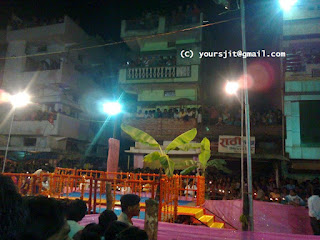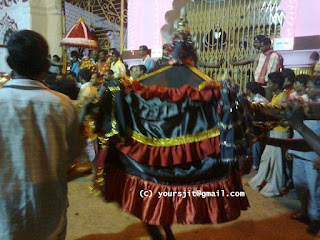Dushera is a festival of victory of Lord Ram over Demon
Ravana. It is a festival of triumph of good over evil. It is one of the
most important festivals all over in India. But there are some parts of
India, where there is different belief for the celebration of this
festival. One such place is Bastar Division of Chhattisgarh. It is an example of uniqueness going ethnically parallel with the traditional belief of India.
Where and How to reach?
Bastar
is connected directly from state capital, Raipur, through NH-43, nearly
300km away from it. It is also reachable through train routes like
Vishakapatnam-Kirandul route, Bhuvneshwar-Jagdalpur route. It is
directly connected from Hyderabad(AP) through NH-16 and Nizamabad
through NH-221.
For Lodging and Boarding, there are no. of luxurious hotels and motels all around Jagdalpur, Divisional Head Quarter of Bastar.
You can reach here on the mid of October-November ‘coz that is the time of Dushera as usual.
Historical Importance:
15th century A.D led to one of the most important event in this division which is responsible for the origin of Bastar Dussehra. The Kaktiya ruler (descendants of great Chalukya Dynasty ) King Purushottam Deo went to Jagannath Puri temple for worship and came back as ‘Rath-pati’ with a divine permission to mount on Chariot. From there this trend continued up till yet. Now , it’s a 500 year old festival of Bastar. Earlier it was a hindu festival, but later incorporated and assimilated many customs of local Bastariyas (Tribes).
Religious Importance:
It is the most important festival of Bastar. As I mentioned earlier, unlike the usual belief of India that blessed by Goddess Durga, Lord Ram killed Demon Ravana on the tenth day which later called as Dussehra, here people celebrate it as a kind of meeting of the common citizens(fellow villagers) of the kingdom(Bastar state of Past) with the king (of that time) blessed by Goddess Danteshwari and Mavli.
Traditional Importance:
Bastar Dussehra involves the participation of diverse tribes and castes, high and low, who constituted the praja here. Each group has a specific task assigned to it. These groups continued to do their age-old tasks even after kingship ended over five decades back.
The
chariot undoubtedly looks very primitive to an outsider. The swaying
juggernaut, when it is pulled by 400+ strong mariyas, impresses upon an
onlooker the strength of aboriginal faith.
Fig: Initiation of Construction of Chariot Photograph by: Jitendra Nakka
Specific Days and their Importance:
Beginning with the new moon(Amavasya) in the month of Shravan, Bastar Dussehra spans over 75 days, ending on the thirteenth day of the full moon(Purnima) in the month of Ashwin. It is thus the longest Dussehra in the world. The festival involves specific days and rituals like extraordinary rigor like a young virgin(kumari) swinging on a bed of thorns; a youth(jogi) sitting in vigil, shoulder-deep buried for nine days; possessed medium of local deities dancing eerily on the roads. On these basis, there are many days which are important like patajatra,deri gadhai, kachhan gadi, kalash sthapana, jogi bithai, rath parikrama, nisha jatra, jogi uthai, maoli parghav,bhitar-raini, bahar-raini, kachan-jatra, muriya-darbar,Ohadi, some of these important days are:
(i) Kachhan Gadi (A throne for Kachhan Devi)
On
the Ashwin Amavasya, a young virgin(kumari) of the Mrigan-Mahara caste
(a scheduled tribe) becomes a medium when a caste diety, kachan devi,
descends on her. The girl swings on a swing of thorns, brandishes a
sword and grants to the king a flower symbolizing her divine sanction to
proceed to proceed with the festival.
(ii) Rath-Parikrama (Chariot Circuit)
A
day after jogi has commenced on his penance, the 4-wheeled
flower-chariot, phool-rath, begins to circulate round the Mavli Temple
every evening upto the seventh day.
(iii) Mavli Parghav (Reception of Devi Mavli )
The
pre-kaktiya presiding diety of Bastar, Mavli Devi, considered an elder
sister of Danteshwari, is the Chief Guest in the congregation of
deities. She is borne from Dantewada in the palanquin(doli) of
Danteshwari. The whole division people floods to welcome her with
lights, earthen lamps, fire works e.t.c. She is then led to
Palace-temple of Danteshwari.

Fig: Welcome stage of Mata Mavli photograph by: Jitendra Nakka
Fig: Picture shows the Salutation of local dieties infront of Goddess Mavli and Goddess Danteshwari at Jagdalpur Palace temple photograph by: Jitendra Nakka
(iv) Bhitar Raini (The Inner Circuit)
On
the tenth day(Vijaydashmi) of the bright moon in the month of Ashwin,
the 8-wheel chariot runs the usual circumambulatory course around the
temple. It has a swing in the top tier where the king would sit and
swing. Presently. The raj-guru sits bearing the holy umbrella(chhatra)
of Devi Danteshwari. After it has completed its inner circuit and been
parked for the night, around 400+ mariyas and muriyas “steal” it away to kamhdakot, a sal(tree dominated area) groove about 2kms away on the southern bank of river Indravati.
Fig: Dussehra Chariot on the eve of Bhitar-Raini (photograph by: Jitendra Nakka)
(v) Baahar Raini (the Outer Circuit)
On the 11th
day of full moon in the month of Ashwin, the king would visit Kamhdakot
to offer cooked rice of the new harvest to the Goddess, along with praja. After that the fellow tribes(praja) again pull the chariot back to the Gate of Palace.
Fig: Tribes pulling the Chariot back to Palace (courtsey: www.corbisimages.com)
Fig: Baahar-Raini eve (by the courtsey of www.knowbastar.wordpress.com)
(vi) Kachan Jatra (Thanks Giving)
This is a thanks giving ceremony organized on the 12th
day of Ashwin Purnima to celebrate the successful conclusion of
festival through the blessings of Goddess Danteshwari and Mavli.
(vii) Muriya-Darbar (Tribal Chieftians’ Conference)
The same day the tribal chiefs confer with the elected representatives and administrative officers om matters related to public welfare.
Conclusion:
So
If you are planning a full week off to visit any beautiful place during
winters, if you wanna enjoy some of the unique customs and traditions
of Dussehra, please do come Bastar. If you want some more information
about Bastar Dussehra, please contact to Chhattisgarh Tourism Board,
Raipur and Jagdalpur. From there, you can get details about this
festival and nearby tourist sites. Don’t forget Chitrakote and
Tirathgarh waterfalls are very near from Jagdalpur.
(Note:
A part of the citation is inspired by tourism catalogue on 'Bastar
Dussehra' published by Chhattisgarh Tourism Board, so you can get more
info from that catalogue also.)
Want to know more about Chhattisgarh,read my post on Tribal Culture and Jagdalpur also known as City of Squares...
Do like and +1 post along with your valuable comments this will keep me motivated....
Want to know more about Chhattisgarh,read my post on Tribal Culture and Jagdalpur also known as City of Squares...
Do like and +1 post along with your valuable comments this will keep me motivated....

















